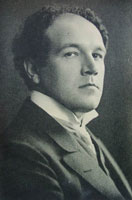![Goedicke Alexander Fyodorovich (March 4 [February 20, O.S.], 1877 – July 9, 1957)](https://musopus.net/wp-content/uploads/2018/10/Goedicke-Alexander-Fyodorovich-March-4-February-20-O.S.-1877-–-July-9-1957.jpg)
Goedicke Alexander Fyodorovich (March 4 [February 20, O.S.], 1877 – July 9, 1957)
BIOGRAPHY
Family
Alexander Goedicke was born in 1877 in Moscow into a family of professional musicians of German descent. Alexander’s great grandfather, Henry Georg (Andrei Ivanovich) was a teacher and inspector of the piano classes of the Smolny Institute, he also composed music.

Nikolai Karlovich Medtner (5 January 1880 – 13 November-1951), was a Russian composer and pianist. Alexander Fyodorovich Goedicke’s cousin.
His grandfather, Karl Genrikhovich (Andreevich), served as an organist at the Church of St. Louis of the French, located in the neighborhood of the Lubyanka in Moscow and he was a music teacher at the Moscow Emperor Nicholas I Institute for Orphans. A famous Russian composer and pianist Nikolai Karlovich Medtner was his cousin. Alexander’s father, Fyodor Karlovich, worked as an organist at the Church of St. Louis of the French and was a piano instructor at the Moscow Conservatory. Alexander received his earliest instruction from his father, who taught him piano, organ and the rudiments of music.
Education and career
Alexander entered Moscow Conservatory in 1892 and graduated from it in 1898. He studied piano with Safonov and Pabst and composition with Arensky. Since 1898 he had worked as a music teacher at the Moscow Emperor Nicholas I Institute for Orphans until its closure in 1918. In 1898 he also taught at the Moscow Lyceum in Memory of Tsarevich Nikolai. In 1900 Alexander Goedicke won the Anton Rubinstein Prize in Vienna for composition. Since 1904 he had worked at the Moscow Elizabeth Institute replacing Sergei Rachmaninoff as a music inspector in 1906. Since January 1907, he had taught piano technique at the Moscow Institute for Noble Maidens, founded in memory of Catherine II. The work at these educational institutions has greatly contributed to the creation of a great educational repertoire, combining technological and artistic merits. Goedicke became a professor of piano at the Moscow Conservatory in 1909.
Works
Being one of the brightest representatives of Russian organ school, Goedicke had given over 200 organ recitals in the Great Hall of the Moscow Conservatory since 1923. He is the author of many musical works, including operas to his own libretto (Virineya (1913–1915), At the Crossing (U perevoza; 1933), Jacquerie (1933–1937), and Macbeth (1944), libretto by William Shakespeare), cantatas, orchestral works for brass band, for the organ, for the piano (Concert Piece (Concertstück) in D major for piano and orchestra, Op. 11; 1900), for violin and cello, for clarinet, romances and others, as well as arrangements of Russian folk songs.
Death
Goedicke died in 1957 at the age of 80.
SHEET MUSIC
You can find and download free scores of the composer:
0 Comments